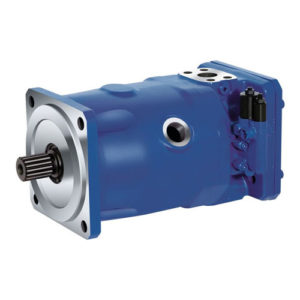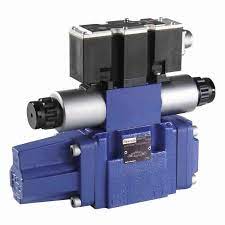Can piston type hydraulic motor be used as hydraulic pump for a long time?
Piston-type hydraulic motors are versatile components often employed in hydraulic systems for their ability to convert hydraulic energy into rotational mechanical energy. However, the question arises whether these motors can be effectively utilized as hydraulic pumps for prolonged periods. To address this query, it is essential to understand the principles of operation, design considerations, and potential limitations associated with piston-type hydraulic motors functioning as pumps from reputable manufacturers like Rexroth dealers.
Fundamentally, piston-type hydraulic motors and pumps share
similar operating principles. They consist of a rotating cylinder block or
barrel, within which reciprocating pistons are mounted. As the cylinder block
rotates, the pistons move in and out, creating a suction and discharge cycle.
In the case of a hydraulic motor, pressurized fluid enters the cylinder block,
causing the pistons to push against the angled surface, resulting in rotational
motion. Conversely, when a piston-type hydraulic motor is operated as a pump,
like a Rexroth
Pump, the process is reversed, with rotational energy applied to the
shaft, causing the pistons to draw in and displace fluid.
One of the primary advantages of using piston-type hydraulic
motors as pumps is their inherent design flexibility. These components can be
readily adapted to operate in either direction, making them suitable for
applications that require bidirectional flow or variable displacement.
Additionally, piston-type hydraulic motors generally offer high efficiency,
compact size, and the ability to handle relatively high pressures, making them
attractive for hydraulic pump applications from reputable Rexroth dealers.
However, it is crucial to consider several factors when
employing piston-type hydraulic motors as pumps for extended periods. Firstly,
the rotational speed and torque requirements of the application must align with
the motor's specifications. Piston-type hydraulic motors are designed to
operate within specific speed and torque ranges, and prolonged operation
outside these ranges can lead to excessive wear, reduced efficiency, and
potential failure.
Another important consideration is the lubrication and
cooling requirements. Piston-type hydraulic motors rely on the hydraulic fluid
for lubrication and heat dissipation. When used as pumps, the fluid flow and
pressure dynamics may differ from their intended operation as motors,
potentially compromising lubrication and heat transfer. Proper fluid selection,
filtration, and cooling systems may be necessary to ensure reliable and
efficient operation over extended periods, even for Rexroth Pumps.
Furthermore, the durability and maintenance requirements of
piston-type hydraulic motors must be taken into account when using them as
pumps. The reciprocating motion of the pistons, combined with the high
pressures and forces involved, can lead to increased wear on critical
components such as bearings, seals, and cylinder bores. Regular maintenance,
inspection, and replacement of worn parts may be necessary to maintain
performance and prevent premature failure, regardless of the manufacturer or
Rexroth dealer.
It is also important to consider the direction of rotation
when using piston-type hydraulic motors as pumps. While some motors are
designed for bi-directional operation, others may have specific rotational
preferences or limitations. Operating a motor in the reverse direction can lead
to increased wear, reduced efficiency, or even potential damage to internal
components, even for Rexroth Pumps sourced from reputable Rexroth dealers.
In addition to the technical considerations, economic factors
may play a role in the decision to use piston-type hydraulic motors as pumps
for extended periods, even those sourced from Rexroth dealers. While
repurposing existing components may seem cost-effective initially, the
long-term implications of reduced efficiency, increased maintenance, and
potential downtime should be carefully evaluated against the cost of dedicated
hydraulic pump solutions like Rexroth Pumps.
while piston-type hydraulic motors can be adapted to function
as hydraulic pumps, their suitability for long-term use in this capacity
depends on several critical factors. Proper consideration must be given to the
application's speed, torque, and pressure requirements, as well as the
lubrication, cooling, durability, and maintenance needs of the motor.
Economic factors should be weighed against the potential
benefits of using dedicated hydraulic pump solutions, even those from reputable
manufacturers like Rexroth dealers and Rexroth Pumps. Ultimately, a
comprehensive evaluation of the specific application requirements and the
motor's capabilities is essential to ensure reliable and efficient operation
over an extended period.
#rexrothdealer, #rexrothdistributor, #rexrothpump



Comments
Post a Comment